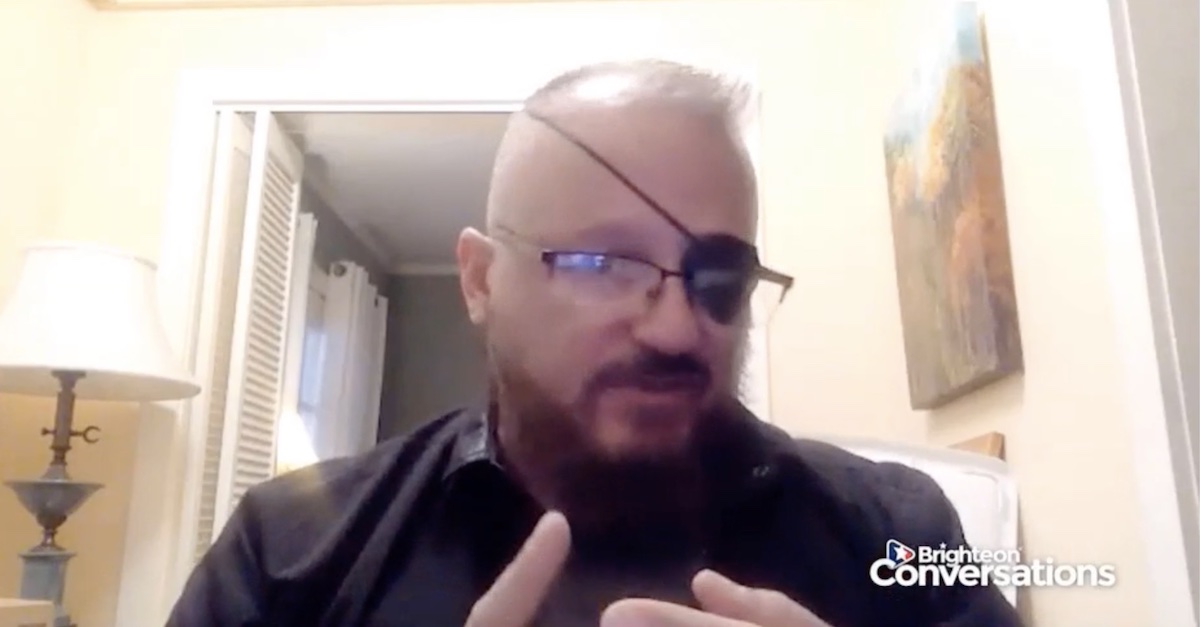
Stewart Rhodes (via trial exhibit).
Defense attorneys attempted to pick apart the federal government’s timeline and undermine the credibility of the FBI investigation into the Jan. 6 attack on the U.S. Capitol building as testimony in the case of five members of the Oath Keepers militia group charged with seditious conspiracy kicked off its second week.
As the trial of Oath Keepers founder Stewart Rhodes and his co-defendants — Kelly Meggs, Jessica Watkins, Kenneth Harrelson, and Thomas Caldwell — resumed on Tuesday, attorneys for the defendants continued the cross-examination of FBI special agent Byron Cody. Last week, Cody’s testimony was largely used to buttress the government’s theory that Rhodes had been planning a violent resistance to a Joe Biden presidency since the days after the 2020 election — plans, the government says, that manifested during the deadly riot at the Capitol on Jan. 6, when Donald Trump supporters overran police and breached the building.
Rhodes attorney Phillip Linder went first, picking up on his cross-examination that started last week and asking Cody when he believes the Oath Keepers started planning for Jan. 6. Cody said he believed it was around mid-December. Linder followed up by asking whether it was after Trump’s Dec. 19 “will be wild” tweet, in which the then-president urged his followers to come to Washington, D.C. on Jan. 6 for a “big protest.” Cody said he didn’t know.
Notably, while Cody’s response as to when he believed the Oath Keepers defendants started planning for Jan. 6 is later than the time period the government alleges that the planning started, Assistant U.S. Attorney Kathryn Rakoczy tried to mitigate this, clarifying with Cody on redirect that the scope of his testimony was intended to cover mid-November 2020 through the early part of January 2021.
Linder also asked Cody about whether he was aware of any sources of income Rhodes might have had other than money from the $50 membership dues from Oath Keepers members during the three-month time period leading up to Jan. 6. Cody says he was not, and affirms to Linder that if Rhodes didn’t have another job at the time, it’s “safe to say” he was living off the dues.
Watkins attorney Jonathan Crisp went next, focusing on when his client would have joined some key chats on encrypted communications app Signal, and appearing to attempt to minimize the duration of her alleged participation in the conspiracy. Specifically, Cody confirms that it appears that Watkins joined the “DC Op Jan. 6 21” Signal chat on the evening of Dec. 31, 2020.
“Hey everyone!” Watkins wrote at the time. “Jess from Ohio here!”
Crisp, appearing to pivot, then asked Cody how many Oath Keepers members he was able to identify in the area of the Capitol around Jan. 6. Cody estimated a “ballpark” around 15-20.
Meggs attorney Juli Haller — one-time “Kraken” lawyer and occasional tester of Mehta’s patience — was next, focusing on the FBI’s apparent decision not to follow up on a tip from a former Oath Keepers member in November 2020 expressing concern about Rhodes’ rhetoric. The former member, Abdullah Rasheed, said that he recorded part of a Nov. 9 call in which Rhodes appeared to call for violent resistance to a Biden presidency and alerted the FBI in November 2020 and again in March 2021.
Haller asked Cody if it’s fair to say that the FBI either initially ignored or missed the November tip. She cut Cody off when he started to reply that the FBI receives thousands of tips a day, and asked him to focus on this particular tip.
“Ignored? No,” Cody said. “Perhaps filed away for future reference.”
Cody said that the FBI’s general practice is to either file a tip for future use or “sent out to the field” for further action, and it was clear that the November tip, when it first came in to the FBI, fell into the former category.
On redirect from Rakoczy, Cody confirmed that Rhodes was in an Oath Keepers “Old Leadership Chat” on Signal from November 2020 until Jan. 2021, and that Meggs was in that same chat as well, at least on Dec. 18, 2020. She closed out her questioning with slides of a message from Rhodes saying that Trump “needs to know the dire consequences” of not taking action to stay in office and that those loyal to him will “nullify, refuse to comply,” “defy,” and “resist” a Biden presidency.
[Screengrab of Stewart Rhodes from interview with right-wing host Mike Adams, via AUSA trial exhibit.]